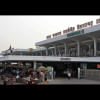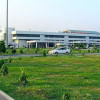Curbs on fund repatriation irk foreign airlines

Many foreign airlines serving Bangladesh are not selling tickets to local travel agencies as they cannot take back most of their earnings from ticket sales due to the dollar crisis in the country.
Unable to repatriate profits, some carriers have opted to sell tickets to overseas online travel agencies (OTA) who in turn sell the tickets to local agents for profit.
This leads to a few problems. One is that the price of a ticket from local agents goes up hurting passengers, especially migrant workers, and the other is that it causes around 3,600 local travel agents to lose business fast, said aviation experts.
Amid dwindling foreign reserves, Bangladesh slowed carriers' profit repatriation. As of June last year, Bangladesh owed foreign carriers $214 million, according to the International Air Transport Association (IATA).
Bangladesh's foreign currency reserves, as of January 17, is about $20 billion.
In June last year, the IATA, a body of some 300 airlines responsible for 83 percent of global air traffic, rated Bangladesh as the second worst in the world in terms of blocking profit repatriation.
Nigeria was rated the worst.
An official of a foreign carrier preferring anonymity said, "The situation is easing but still terrible. We cannot remit our earnings properly. We switched to OTA so that we can remit profits."
An official of another carrier said, "We were able to buy dollars from banks before and remit our earnings through a designated bank but now the dollar crisis has blocked this path."
The official also said the delay in fund repatriation was costing them dearly as the taka lost 25 to 30 percent of its value quickly.
According to the the Civil Aviation Authority of Bangladesh (CAAB), 32 foreign carriers operate around 160 flights to and from the Hazrat Shahjalal International Airport every day.
"If the situation doesn't improve, the air ticket business in Bangladesh, worth around Tk 40,000 crore, will go to the hands of overseas online travel agents," said Association of Travel Agents of Bangladesh (ATAB) Secretary General Abdus Salam Aref.
Prices of tickets on different routes, especially long-distance routes like New York, Canada, and London, have also gone up by $50 to $100, he said.
The government is losing revenue as the tickets are being sold abroad, he claimed.
ATAB President SN Manzur Murshed said people are having to buy tickets of higher tier as foreign airlines have stopped their system for selling low-fare tickets in Bangladesh.
He said a ticket to Bangkok is now about Tk 25,000 from any local travel agent whereas an OTA can sell the same ticket for Tk 20,000.
He said they have repeatedly requested the CAAB to address this issue.
Kazi Wahidul Alam, an aviation expert and editor of an aviation and tourism journal, said the crisis has been persisting for a long time.
"Bangladesh Bank is giving opportunities to some airlines to remit a portion of their earnings, which is not enough. That's why most airlines are not selling low-fare tickets in Bangladesh.
"As a result, Bangladeshi passengers and local travel agents are hurting," he said.
Wahidul said this is giving Bangladesh a bad name. "Airlines interested in serving Bangladesh will feel discouraged."
The complaints of foreign airlines and aviation authorities are also embarrassing government officials and harming the country's image abroad.
For instance, the chiefs of civil aviation authorities and carriers of different countries met at the International Civil Aviation Organisation (ICAO) air service negotiation event in Riyadh in December.
There, they asked Air Vice Marshal M Mafidur Rahman, chairman of CAAB, when they would get their money stuck in Bangladesh.
"In front of everyone, they were asking our CAAB chief to release their blocked funds, which tarnished our image," said a Bangladeshi official who attended the meeting.
Asked, the CAAB chief said, "As huge investments of different airlines are stuck in Bangladesh, chiefs of different airlines and heads of civil aviation authorities of different countries have requested me so we take measures to transfer their earnings to their own countries."
He said, "We have already requested Bangladesh Bank through the civil aviation ministry."
However, Mezbaul Haque, spokesperson for the central bank, told The Daily Star that he did not have any information that foreign airlines were unable to send their earnings back to their countries due to the dollar crisis.

 For all latest news, follow The Daily Star's Google News channel.
For all latest news, follow The Daily Star's Google News channel. 






Comments